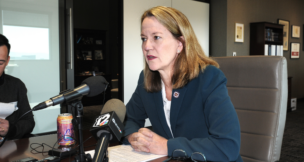Courts block school mergers on voting technicality
Arizona Capitol Reports Staff//December 19, 2008//[read_meter]
Courts block school mergers on voting technicality
Arizona Capitol Reports Staff//December 19, 2008//[read_meter]
School districts across the state are trading their merger plans for court papers after a Maricopa County Superior Court judge ruled in favor of a claim filed by Phoenix elementary educators who questioned the validity of elections approving school district unification.
Judge Edward Burke’s decision ended plans by five Phoenix districts to unify by the 2010-2011 school year. Tolleson, Union, Littleton, Pendergast and Fowler elementary school districts, where a majority of those who cast ballots Nov. 4 in those districts approved the unification ballot measure, will remain individual districts after Burke ruled the apparent success of the unification measure in the districts did not satisfy statutory requirements.
“The school districts just wanted to know from a legal standpoint whether the measure passed or did not pass,” said Chris Thomas, director of legal services for the Arizona School Boards Association.
According to court documents, the basis for the judge’s decision to cut short unification efforts by the Southwest Valley school districts was the language of the 2005 legislation creating the State School Redistricting Commission. The way it was written, the statue requires a majority of all registered voters, not just those actually voting, to pass the ballot measure.
For instance, voters in Fowler Elementary District approved the unification plan by 61 percent of the vote. But those who voted represented only 30 percent of the district’s registered voters.
The Dec. 15 verdict reaffirms a ruling handed down earlier this month by a judge in Pima County. Plans to merge Alter Valley Elementary School District into a larger K-12 school district were halted by the judge on Dec. 5, because a majority of the district’s registered voters failed to approve unification.
Bill Christensen, superintendent of the Tolleson Elementary School District, said the court’s decision is beneficial for the students.
“We didn’t support unification from the very beginning,” Christensen said. “Unification makes sense for some schools, I think, but it doesn’t make sense for us at all.”
Marvene Labato, superintendent of the Fowler Elementary School District, said the district has received support from parents, even those who voted for unification in November.
“People have told us: ‘We thought by voting yes it was a good thing for the district because we always vote yes for your overrides and the bonds,’” Labato said. “They wanted to know how to appeal it and wondered if we could do the election over.”
But Marty Shultz, chairman of the commission, said during the court hearing Dec. 12 that opponents of unification are hanging onto a technicality.
Shultz said he intended to “investigate” who at the Legislature made the mistake of including language contrary to the members’ intent.
“Legislators and advocates expect Legislative Council and the House and Senate lawyers to review pieces of legislation,” he told the Arizona Capitol Times. “Who failed to draft legislation consistent with their intent?”
Thomas said the intent of the legislators while drafting the law is immaterial to the interpretation of the statute.
“We realize that is not the intent of the legislators, but intent only matters if there is an ambiguity in the language,” Thomas said. “There clearly wasn’t any ambiguity in this language.”
Statewide, voters approved six of the merger plans put together by the Redistricting Commission to combine Arizona’s 76 school districts into 27 K-12 districts. Of the six, only those districts involved in four plans — all located in rural Arizona — are still headed for unification in July 2010 after the courts’ December rulings.
But some of the remaining schools scheduled for mergers have also expressed plans to challenge the electorate’s decision.
Cochise County’s Palominas Elementary School, which took a neutral stance on unification in the months leading up to the election, has also filed a complaint with the Cochise Superior Court. A hearing has not yet been scheduled.
The 13-member Redistricting Commission met Dec. 9 to discuss future unification proposals before it sunsets on Dec. 31.
The commission’s decision not to resubmit unification proposals before the end of the year was supported by the Arizona School Boards Association.
“Our members believe in local control; they think if unification is to happen, it should be an organic process that the locals decide to do,” Thomas said during the meeting.











